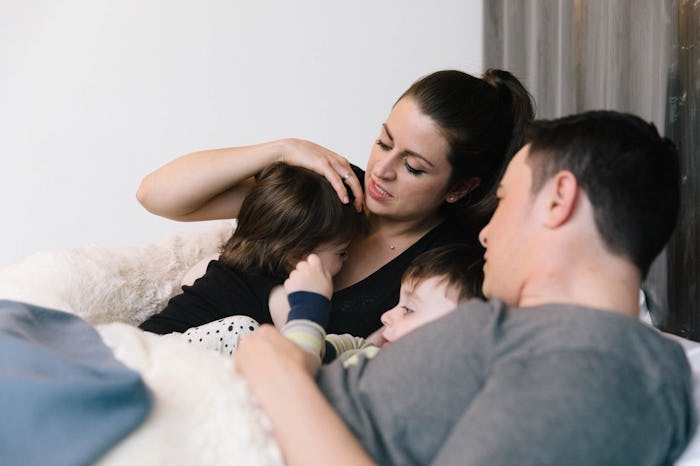Life
Science *Finally* Explains Why Kids Will Squish Into Mom Before Sitting With Dad
"Mama, pick me up!" "Mama, move over so I can snuggle." "Mama, can I share your seat?" This is a familiar refrain in my house. Just recently, we were all at the movies together, all of us in our own seats, and about 10 minutes into the movie, a little body plops herself on my recliner with her overly-buttered bag of popcorn and lays back across me. I couldn't see the movie and was now blanketed in child. My husband? Blithely snoring through the boring film. Why is it never them? Why do kids always want to sit with Mom?
The phenomenon of children always wanting to sit with their mothers is mostly limited to situations where mothers are the predominant caregiver in the household, according to research published in the American Journal of Perinatology. And it starts in the very beginning. The journal noted that those first few months of life are critical in forming reliant bonds between the mother and child, and because the mother is usually the primary caregiver during those first days, it sets in the brain that preference that children have for their mothers. It's not that they're not also attached to their other parent, it's just that they haven't had the same sort of prolonged exposure to their other parent as they have their mom.
This mother-child interaction is an example of what researchers refer to as a "synchrony," according to PlosOne. They wrote that "synchrony describes the intricate ‘dance’" that "builds on familiarity with the partner's behavioral repertoire and interaction rhythms." And that it's an example of the special nature of this "interpersonal exchange that are clearly separated from the stream of daily life." Meaning that even if your husband is alone in bed, and you're sleeping on the sofa because you fell asleep binging Queer Eye, your child will pick the crowded sofa over the king-sized bed.
And it's actually a really good thing. I know, I know, but hear me out. Researchers published in Journal of Child and Family Studies that this type of mother-child bond teaches children what is known as "prosocial behavior." Prosocial behaviors are those that would be considered "altruistic" or helping behaviors. The closeness mothers and children exhibit assists children in their own emotional growth. The journal wrote that there is "a positive link between the quality of relationships with early caregivers and children’s prosocial behavior." Because they see you being caring, they learn to be more caring, and also rely on you to continue to be so giving by cuddling up next to you and sucking in all of your good mom energy.
But is it more than that? I spoke with neurological post doctorate Dr. Allen Wahl of Brooklyn, New York and asked him why your kids go out of their way to sit on your lap instead of with their other parent. He tells Romper, "It's not as stark an issue as it once was when more moms stayed at home with the kids, but it's still there. Mothers are still the primary caregivers in most houses, mine included." He notes that because mothers are the ones who usually do the emotional labor and care for the children, children are naturally going to be more drawn to that sense of comfort and safety.
While it's insanely annoying at times to basically be the mom jungle gym, I am glad that I can provide that loving, soft place for my kids to land. Sure, there are times I'd rather not assume the place of sofa, swing, and bed, but more often than not, I'm glad that they choose me to snuggle with. If only because that means I can keep my butt on the sofa. I mean, take the good with the annoying, right? Now, if you'll excuse me, I'm going to ask my husband to fetch us some La Croix.
